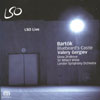Bartók Bluebeard's Castle
For the perfect introduction to Bartók’s Bluebeard look no further
View record and artist detailsRecord and Artist Details
Composer or Director: Béla Bartók
Label: LSO Live
Magazine Review Date: 10/2009
Media Format: Hybrid SACD
Media Runtime: 0
Catalogue Number: LSO0685

Tracks:
| Composition | Artist Credit |
|---|---|
| Duke Bluebeard's Castle |
Béla Bartók, Composer
Béla Bartók, Composer Elena Zhidkova, Judith, Mezzo soprano London Symphony Orchestra Valery Gergiev, Conductor, Bass Willard White, Duke Bluebeard, Baritone |
Author: Rob Cowan
Interestingly, the Prologue is spoken in English (by Sir Willard himself) whereas the opera is sung, as it must be for its true musical effect to register properly, in Hungarian. White does fairly well with Hungarian though his vibrato tends to widen a little under pressure. Elena Zhidkova isn’t the most seductive of Judiths – she sounds a mite too needy for my tastes – and like White, the beat of her vibrato can be distracting, but she acts well and her singing generates considerable intensity. Gergiev keeps the Prologue on the move but I missed an element of shock as the first door reveals the torture chamber. The damp-squib effect is further underlined by Zhidkova’s rather feeble “Jaj” [Woe]. The castle’s armoury, too, hardly inspires fear or terror, but Gergiev comes into his own when delving among Bluebeard’s treasures, a brightly glistening blend of sonorities, and basking in his fragrant gardens. The fifth door is spoiled somewhat by Zhidkova entering fractionally off cue, but the panoramic impact of the LSO’s playing partially compensates.
As to placing Gergiev among his rivals, I’d suggest that Haitink (with von Otter and Tomlinson) is marginally more moving and Kertész (with Ludwig and Berry) more alluring. And then there’s the joy of hearing Mihály Székely and Klára Palánkay dancing around the Hungarian language as no one else quite manages, with János Ferencsik conducting (for Hungaroton, in mono). But why have we in the UK still never had Iván Fischer’s Budapest Festival recording of Bluebeard, not necessarily the best-sung, but certainly one of the best conducted? I’m puzzled.
If comparisons are less of the essence than hopping aboard an operatic masterpiece for the first time then rest assured, Gergiev, his orchestra and his singers offer good accounts of themselves and, by extension, of Bartók too.
Discover the world's largest classical music catalogue with Presto Music.

Gramophone Digital Club
- Digital Edition
- Digital Archive
- Reviews Database
- Full website access
From £8.75 / month
Subscribe
Gramophone Full Club
- Print Edition
- Digital Edition
- Digital Archive
- Reviews Database
- Full website access
From £11.00 / month
Subscribe
If you are a library, university or other organisation that would be interested in an institutional subscription to Gramophone please click here for further information.




